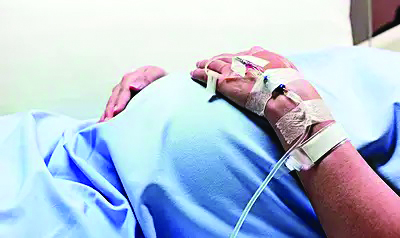Audit reveals insufficient blood and iron access as leading cause of maternal deaths

Lucknow: In a recent audit of maternal deaths, it has been discovered that the majority of these fatalities are attributed to limited access to blood and iron, resulting in high rates of anemia among pregnant women. Tragically, many of these women were unable to reach hospitals in a timely manner, depriving them of essential treatment. The findings of this audit have been presented to the government by the health department, urging swift action to address this pressing issue.
Maternal death refers to the unfortunate loss of a pregnant or birthing individual during pregnancy or within 42 days after childbirth due to pregnancy-related health complications. To gather accurate data on maternal deaths, the government initiated an audit focusing on pregnant women at BRD Medical College, Gorakhpur. Over the span of the past eight months, the health department identified 49 cases in which pregnant women tragically lost their lives. In response, a committee comprising expert doctors was formed to investigate the underlying causes, and their findings have been deeply concerning.
The medical team uncovered that the deceased pregnant woman had significantly low blood volumes, measuring only five to six grams, well below the average requirement of 12 grams. Consequently, the development of the fetuses in their wombs was compromised. Insufficient blood levels led to anemia, resulting in inadequate oxygen circulation to the fetuses.
“The fetuses had already perished before delivery. Furthermore, deficiencies in iron and folic acid were prevalent among these pregnant women, both of which are essential for a healthy pregnancy,” the report said. Dr Ashutosh Kumar Dubey, the Chief Medical Officer (CMO), revealed that investigations into the deceased pregnant women unveiled a lack of regular check-ups and tests as the primary reason for maternal deaths. “Additionally, excessive bleeding during delivery exacerbated their condition. By the time these women sought medical attention, their health had significantly deteriorated, diminishing their chances of survival,” Dr Dubey said.
“As a preventive measure, it is strongly advised that all pregnant women undergo blood tests every three months and receive at least four ultrasounds to monitor the well-being of their developing babies,” he said. The CMO emphasised that the primary goal of conducting this audit was to avert further maternal deaths. Identifying the root causes allows for the implementation of appropriate measures to ensure the safety and well-being of pregnant women. Moreover, the CMO highlighted that 90 per cent of the reported cases originated from rural areas, underscoring the urgent need for enhanced healthcare access and awareness in these regions.
Dr Sudhir Gupta, a renowned gynecologist, and obstetrician from BRD Medical College, shed light on the impact of inadequate blood levels during pregnancy. He explained that the average pregnant woman should possess 12 grams of blood, yet an alarming 90 per cent of women currently suffer from anemia, posing a significant concern.
“Insufficient blood supply hampers proper fetal development within the womb, leading to potentially fatal complications,” he said.
Pregnancy induces notable physiological changes, with blood volume increases by approximately 20-30 percent to accommodate the heightened requirements of iron and vitamins necessary for hemoglobin production. The lack of these vital components contributes to a considerable number of maternal deaths.
The revelation of the audit’s findings highlights a critical healthcare crisis affecting pregnant women. Urgent action is required from the government and health authorities to address this issue promptly. Efforts should be directed towards improving access to prenatal care, advocating for regular check-ups, and providing essential blood and iron supplements. By prioritizing the well-being of pregnant women, the authorities can work towards preventing further tragedies and ensuring safe pregnancies for all.



